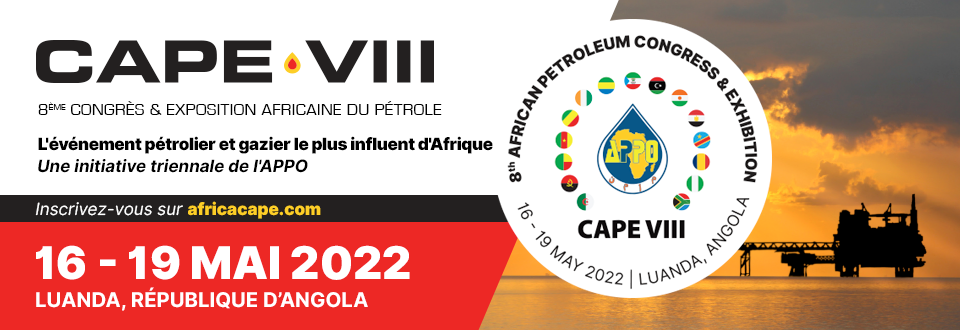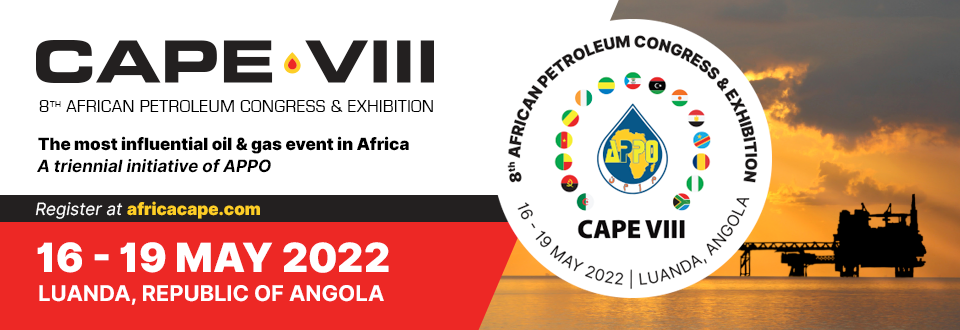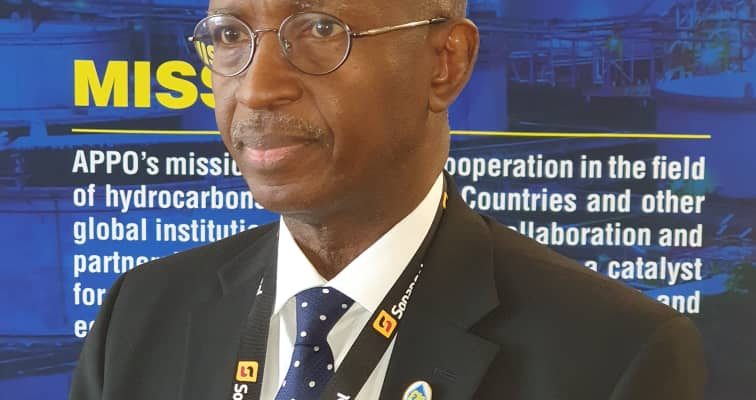POSTED ON CAPE VIII WEBSITE
Dr Omar Farouk Ibrahim holds a Doctorate degree in Political Science from Rutgers University, New Brunswick, New Jersey, USA, 1988, a Master’s degree from Bayero University, Kano, Nigeria, 1983, and a bachelor’s degree from Ahmadu Bello University, Zaria, Nigeria, 1980.
Dr Ibrahim assumed the position of APPO Secretary-General on 4th January 2020. Until then he was Adviser on International Energy Relations to the Minister of State for Petroleum Resources of the Federal Republic of Nigeria. In that position, he represented Nigeria on the boards of several inter-governmental energy organizations. He was Nigeria’s Governor to the Vienna-based Organization of the Petroleum Exporting Countries, OPEC, 2015-2020 and Executive Board Member at the Doha-based Gas
Exporting Countries’ Forum, GECF, 2015-2020. At the same time, he coordinated Nigeria’s affairs at the International Energy Forum, IEF, and later the African petroleum Producers’ Association, APPA.
Dr Ibrahim was, between 2010 and 2014, General Manager and later Group General Manager, Group Public Affairs Division, at the Nigerian National Petroleum Corporation, NNPC.
Before joining the NNPC, Dr Ibrahim spent seven years February 2003 – December 2009 as Head of the PR and Information Department and a member of senior management at the OPEC Secretariat, in Vienna. He was the Executive Editor of the OPEC Energy review and Editor-in-Chief of the OPEC Bulletin.
Before venturing into the oil sector in 2003, Dr Ibrahim was in the media where he was at various times the Managing Director/Chief Executive Officer of the Nigerian Federal Government-owned media house the New Nigerian Newspapers between 1999 and 2003. He was also the chairman of the Board of Directors of Newpack Printing and Packaging Company Limited. Before coming to the New Nigerian, Dr Farouk had spent nine years in various positions at the Daily Times of Nigeria, ranging from Member of the Editorial board to a columnist and Op-Ed editor, General Manager Nigerpack Press, Group Controller of Administration.
Dr Farouk joined Bayero University as a Graduate Assistant in the Department of Political Science in 1981 after his national service and rose to the rank of Lecturer by the time he left academia for journalism in 1990.
- The Secretariat of APPO has been reorganized for more efficient operations, can you share with us how the reorganization has impacted the management of the Secretariat.
Actually, it was not just the Secretariat that was reorganized. The whole organization was reformed and the Secretariat was restructured in a major exercise that ended in later 2019. The decision-making process, the role of the Executive Board, the reform of the finance arm of APPA, and most important the new focus and direction of the Organization. All these were done in response to the changing global energy scene from what it was when the African Petroleum Producers’ Association, APPA, was founded in 1987.
Our Organization is a living organization and so adapts to changing environments in which it finds itself. The global energy scene of 1987 was not what it is today. Back at the time APPA was founded oil was the dominant fuel source. The major fear about oil was not its environmental credentials, but that oil production was going to peak and there would be supply challenges. Today, no one is talking about peak oil because technology keeps increasing global fossil fuel reserves and that the more the world consumes the more finds it makes.
The challenge today is the paradigm shift away from fossil fuels to renewable energies. That paradigm shift came with is challenges to African oil and gas producers. It awakened to the reality that the economies of many of our many countries are heavily dependent on oil and gas revenue. But even more important was the realization that all the while that we have been producing oil and gas, we have been very dependent on external expertise, technology, markets and finance. It was these realizations that informed the major reform of APPA to APPO in order to equip it to address the identified challenges.
Today, we have a strong and professionally run Secretariat with seasoned experts on the Board to give guidance and direction, and the Ministerial Council to make policies and take critical decisions. In addition, the reformed APPO has created a Forum of APPO Heads of State that shall be meeting to give the required guidance and support at the highest level.
- What are the strategies that APPO will implement to ensure the African oil and gas industry remain relevant in view of the global advocacy for reduction in fossil fuels to achieve net-zero emissions as a means of overcoming the challenges of climate change?
I have alluded to the fact that the operations of African oil and gas industry has been dominated by external interests, either in the form of International Oil Companies (IOCs), or international financial institutions for financing or even markets to sell our oil and gas. It might interest you to know that Africa exports about 75 per cent of the oil it produces and some 40 per cent of the gas. The implication of losing these markets, the source of the funding of projects and the technology is going to be grave for a continent that has proven reserves of over 125 billion barrels of oil and over 600 trillion SCF of gas.
But then, if we lose our traditional markets can’t we develop new markets? With 1.3 billion people, 600 million of whom have no access to electricity and an even greater number have no access to any form of modern energy for domestic use, Africa cannot claim not to have a market. There is a huge potential market that needs to be developed. And that is one of the foci of APPO.
Equally important is the funding challenge. For too long we have relied on extra-continental finance to do our oil and gas business. We have been made to believe that the business is so capital intensive that Africa cannot finance it. I guess, now that the traditional funders have indicated their commitment to leave the industry, we have to find a way to finance our projects if we are not to declare our huge assets as stranded. The Africa Energy Investment Corporation, AEICorp, the reformed financial arm of APPO that used to be the APPA Fund, is looking deeply into this issue.
As for technology and expertise, we are prepared to import technology and experts from anywhere that has them but is forced to do away with them due to pressure from anti-fossil fuel groups. But more importantly, APPO is championing the development of African Local Content. We are looking into establishing (perhaps identifying existing ones and upgrading them) centres of excellence in the various sectors of the industry across the various sub-regions of the continent.
I should like to emphasize that Africa is not against the energy transition, or any reasonable and equitable measure introduced to make the world a better place for all. However, we must not be stampeded by those who have used fossil fuels for over 150 years to develop their economies and people into abandoning the same fuel at a time we are poised to make our breakthrough. This is more so, when it is remembered that the dangers of fossil emissions were known as far back as 150 years ago, but that knowledge was carefully concealed by today’s developed countries because they were determined to consolidate their industrialization. Now that they have passed the industrial stage, they are preaching that no one else should use it because it is harmful.
It is a matter of priority. To the developed world, today’s fuel should be Clean, Affordable and Reliable, in that order. To us in poor countries it is Affordable, Reliable and Clean. And for now, fossil fuels are the most affordable, most reliable and clean compared to the biomass that the majority of our people in the rural areas use for cooking and domestic heating.
- The next edition of CAPEVIII will take place in Luanda, Angola from 16-19 May 2022, what strategies are being employed by the APPO Secretariat to mobilise the member countries to participate in the event?
CAPE is a statutory event of the APPO. It is a triennial meeting between oil specialists from around the world and senior African oil and gas executives.
It is an initiative of APPO with the objective of providing a platform for developing relationships and links between decision-makers and professionals in the sector, a forum for sharing experiences and discussing strategies, opportunities for business development, investments, partnerships, etc.
This is the 19th year since we started CAPE. The first CAPE was hosted in Tripoli, in 2003, followed by Algiers in 2005, Cotonou in 2007, Kinshasa in 2010, Libreville in 203, Abuja in 2016, Equatorial Guinea in 2019 and the 8th in Luanda.
Organized under a theme focused on the energy transition and the future of the oil and gas industry in Africa, this year’s CAPE VIII will provide an opportunity to understand the challenges of the energy, oil and gas sector which is very important to APPO Member Countries, given the huge investment made by international and local private economic operators in this industry.
Africa, which currently accounts for less than 10% of global oil and gas production, there is a consensus that Africa will be the most affected, economically, and socially, if the world moves away from fossil fuels. Indeed, although the continent has over 125 billion barrels and 500 trillion cubic feet of proven oil and gas reserves respectively, the African industry has been largely dominated by foreign technology, finances, and operators.
Unlike some of the previous CAPE, CAPE VIII will be unique in the sense that there will be many Secretariat events on the side of the CAPE. For example, there will be a meeting of the CEOs of APPO Member Countries NOCs, a meeting of the APPO Long Term Strategy Committee as well as an Extraordinary Ministerial Meeting. The responses we have so far are very encouraging.
- How can APPO use the conclusions and recommendations of the CAPEVIII to influence oil and gas policies in the member countries of the organisation?
The whole essence of the discourses, presentations, panels and interviews is to exchange thoughts with a view to articulating positions for the consideration of policy and decision-makers. In that respect, CAPE VIII shall not be different.
- What are the expectations of APPO and the member countries for the CAPEVIII taking place in Luanda?
We expect to have a very fruitful CAPE VIII.
REGISTER TO ATTEND CAPE VIII HERE



